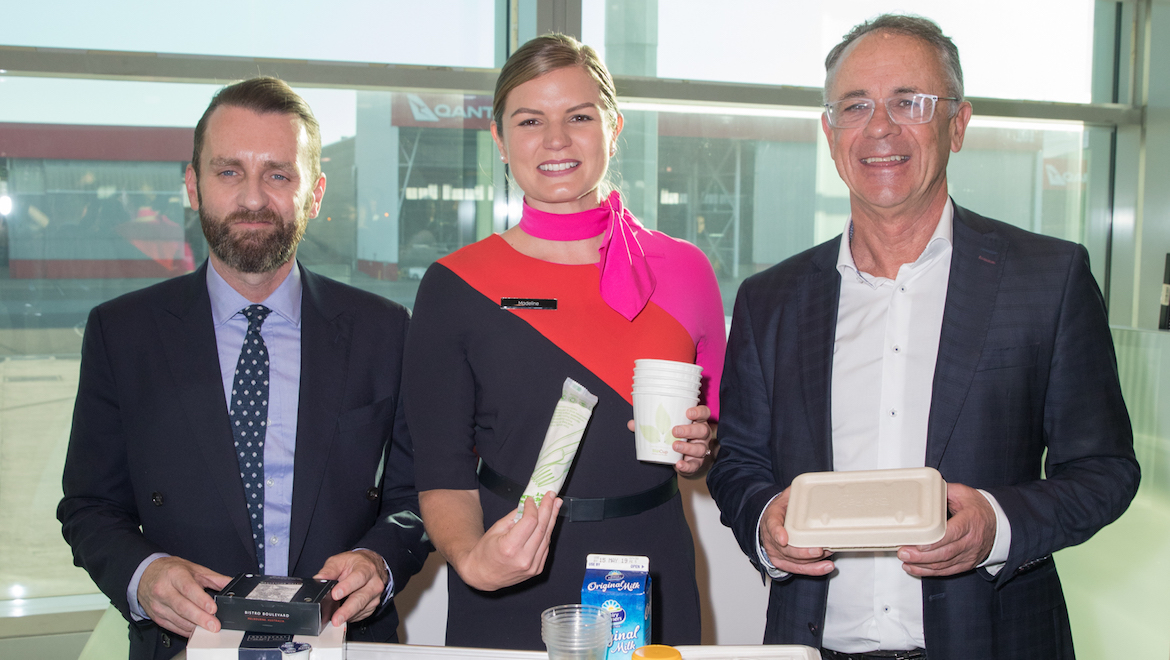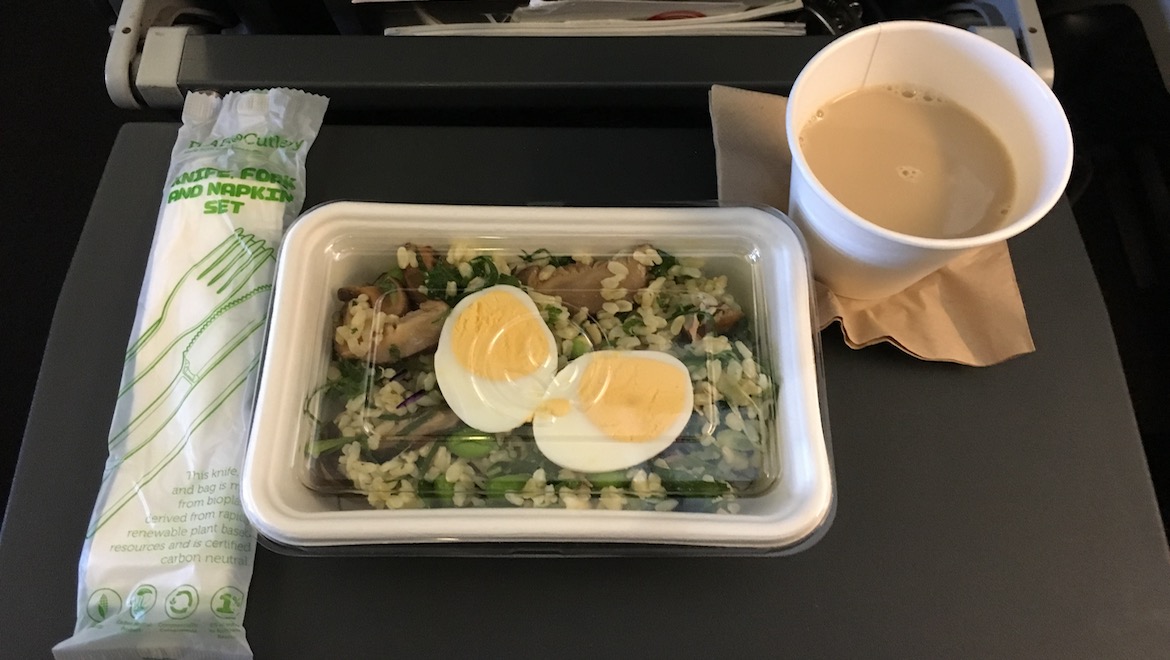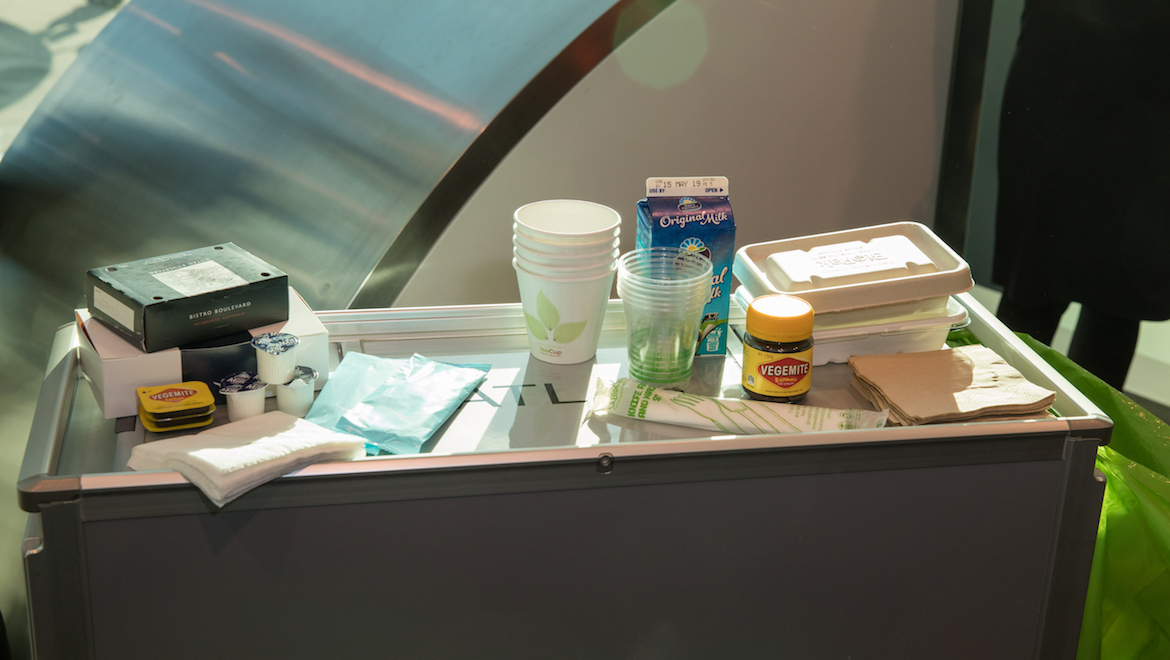
Qantas has conducted what it describes as a “zero waste” commercial flight as part of the airline group’s efforts to reduce the amount of plastics, paper and food it sends to landfill.
All of the waste produced on flight QF739, operated by Boeing 737-800 VH-VZO that took off from Sydney a little after 0815 local time on Wednesday, will either be reused, recycled or disposed of via recycling.
The trial flight is part of the airline’s efforts to reduce what it sends to landfill by 75 per cent by the end of 2020.
Qantas group executive for government, industry, international and sustainability Andrew Parker said the “zero waste” commercial service comprised about 1,000 different changes of processes and products on a typical flight.
“That gives you a sense of the scale of what we are changing on each 737 service,” Parker told reporters at Sydney Airport prior to the departure of QF739 on Wednesday.
In February, Qantas said it was aiming to remove 100 million single-use plastic items from its flights and premium passenger lounges across the airline group by the end of 2020.
Examples of this include replacing plastic wrapping on blankets, headphones, pens and pyjamas altogether or replacing them with suitable alternatives.
The airline is also changing some of its food packaging to more sustainable materials, such as cutlery sets, coffee cups, plastic cups and headrest covers.
Further, Qantas and its low-cost carrier (LCC) business Jetstar were aiming to cut the amount of waste they sent to landfill by 75 per cent by the end of 2021.
On QF737, the meal was presented in a container made from sugar cane fibre, while the fork and spoon were made from crop starch. Both were fully compostable.

The environmental push would require staff training for cabin crew and other staff to lean new processes for the service delivery on board the flight.
For example, cabin crew on Wednesday’s flight had a green bag for food waste and separate trays for the food containers and cups.
Some of the sustainable on-board products – that are also used at places such as sporting stadiums, music festivals and by takeaway outlets – were being supplied by BioPak, while the recycling and sustainable disposal work was being undertaken by Suez.
Qantas domestic chief executive Andrew David said there would be significant staff training as the use of these sustainable items was rolled out following an evaluation of the trial flight.
“Whenever you change product and service flow on board aircraft there is a lot of things to do,” David told reporters prior to the departure of QF739.
“We have thousands and thousands of cabin crew to train we have all our catering staff, all of our ground staff.
“All of that work has to be done, there’s a regulator you need to take on this journey as well whenever you make changes like this.”

In addition to BioPak and Suez, Parker said there were about 30,000 small and medium businesses who were also working with Qantas on redesigning and repackaging the different products and processes used on board.
“Today is essentially firing the starting gun on the bigger initiative that we have got at Qantas to eliminate 100 million single-use plastic items and 75 per cent of all the waste that we currently send to landfill,” Parker said.
“It also is a critical part of the bigger picture for Qantas to dramatically reduce our waste over the next two years.
“From today we think big things will grow in terms reducing and eliminating 75 per cent of all of the waste Qantas currently produces.”
Parker said Qantas was keen to work with other airlines on the sustainability push by cooperate on the supply chain and on supplying products where possible.
David said the airline group’s efforts to reduce the amount it sent to landfill was something customers, staff and shareholders had been asking for.
And while there would be an initial costs incurred as the new service delivery and as plastic-free and sustainable products were introduced, David said the airline would eventually save money.
“In the long term we would expect cost to come down because you are eliminating the waste and that waste at the moment goes to landfill and we do know the cost of landfill will continue to rise,” David said.
“Ultimately we save money out of this.”
BioPak chief executive Gary Smith described the Qantas initiative as the “most ambitious waste reduction target of any major airline globally”.
“We are truly excited to be at the forefront in providing state-of-the-art, eco-friendly products that solve the impending issue of single-use plastics,” Smith said in a statement.
“Innovation is at the heart of what we do. For more than a decade we have been working with companies across Australia and NZ to provide a viable solution to our current waste crisis, and it is wonderful to see Qantas Group join our ever-expanding network.”
Suez Australia and New Zealand director of marketing, communications, national key accounts and sustainability Justin Frank said the flight was an important step towards reducing the overall impact on the environment.
“Suez and Qantas have collaborated for over 15 years now and we’re looking forward to continuing to help them achieve their targets of diverting waste from landfill, using sustainable products,” Frank said in a statement.
















AlanH
says:Wonderful initiative Qantas! Let’s hope other airlines follow your lead.
John Gayman
says:All good for the environment , just as long as this is not another corporate stunt to make further profits for Board Members and CEOs bonuses !!
Ronnie
says:Seems the airline world thinks it is better to biodegrade than to wash china and metal cutlery. Have we also overlooked recyclable plastics and glass. Heavy in-flight magazine should be on screen. Other ways to achieve low environmental impact than to pay for corn starch products and increase cabin processes.
Hunayun
says:Good
Jacqueline
says:A great start, QANTAS. Thank you!